- Home
- Frank Herbert
Destination Void Page 8
Destination Void Read online
Page 8
“It’s only a matter of degree, not basic difference,” she protested.
“He was like Aladdin rubbing the lamp compared to us,” Flattery said. “And even if his intentions were the same as ours, he wasn’t aware of it.”
“You’re talking in circles.”
“Am I, really? This is the thing that writers and philosophers have skirted for centuries with their eyes half averted. This is the monster out of folklore, Prue. This is Frankenstein’s poor monster and the sorcerer’s apprentice. The very idea of building a conscious robot can be faced only if we recognize the implicit danger—that we may be building a Golem that’ll destroy us.”
“In your off hours you tell ghost stories.”
“Laughter’s as good a way as any of facing this fear,” he said.
“You’re really serious!” she accused.
“Never more serious. Why d’you suppose Project’s so happy to send us far out into space to do our work?”
She tried to swallow in a dry throat, realized she was afraid. Flattery had touched a nerve. He had produced a powerful truth from somewhere. She forced herself to face this as a fact when she felt an urge to call the computer shop and beg Bickel and Tim to stop whatever they were doing. The urge sent a chill along her spine.
“Where do we draw the line between what’s living and what’s inanimate?” Flattery asked. He studied her, seeing the fatigue shadows under her eyes, the trembling of a nerve at her temple. “Will our … creature be alive?”
She cleared her throat. “Wouldn’t it be more to the point to ask if our creature will be able to reproduce itself? If there’s any danger … any real danger to—”
“Then, indeed, we may be on forbidden ground.” And he wondered why this thought always brought such an empty feeling in the pit of his stomach.
“Oh, for God’s sake, Raj!” Prudence was vehement. “Have you completely forgotten that you’re a scientist?”
“For God’s sake, I can never forget it,” he said quietly.
“Stop that!” She realized her voice unconsciously had assumed the peremptory tone of her dormitory mother back in the UMB crèche. Dormitory mother! A gray-haired image whose touch was never more than the padded flexor of a robot which she directed from some remote sanctuary in Project Central. Such a sad woman she’d been, so cynical and … remote.
“Religion makes demands that can’t be denied unless you’re willing to pay a terrible price,” Flattery said.
“Religion’s just a fact like any other,” Prue countered. “We investigate primitive religions. Why can’t we investigate our own? Didn’t God make us curious? Aren’t we as scientists supposed to put ourselves beyond the reach of prejudice?”
“Only a fool imagines he’s beyond the reach of his prejudices.”
“Well, I prefer to be a Calvinist, I’m willing to be damned for the greater glory of God.”
“You mustn’t say such things,” he snapped. He put a hand to his head, thinking: I mustn’t let her goad me this way.
“You can’t show me anything I mustn’t say,” she said. “You claim scientists can equate God with ideas of mathematical infinity. We manipulate mathematical infinity; why can’t we manipulate God?”
“What silly pretensions,” he said. “Mathematical infinity. Zero over zero, eh? Or infinity minus infinity? Or infinity times zero?”
“God times zero,” she said. “Why not?”
“You’re the mathematician!” he said, his voice pouncing. “You know better’n anyone that these are indeterminate forms, mathematical nonsense.”
“God minus infinity. Mathematical nonsense.”
He glared at her. His throat felt dry and burning. She’d tricked him into this corner. It was blasphemy! And he was more vulnerable than she was … guiltier.
“You’re supposed to be doing this to me, aren’t you,” he accused. “You’re supposed to push me and test me, give me no peace. I know.”
How little he knows … or even suspects, she thought. “Infinity doesn’t follow the conditions of number or quantity. If there’s a God, I don’t see why He should follow those conditions, either. As for testing you: horseradish! All you need’s an occasional kick in the philosophy.”
“Stick to my preaching and let you play with the math, is that it?”
“There’s no blasphemy in developing a new kind of calculus or any other new tool to deal with our universe,” she said.
“Our universe?” Flattery asked.
“As much of it as we can take,” she said. “That’s the whole idea of a colony ship, isn’t it?”
“Is it?” he asked.
She adjusted the course-constant repeater, said, “I’ll stick to math. How about a calculus that goes beyond the limits of X over Y as they tend toward infinity? That should be possible.”
“Creating a new kind of calculus and building this living, sentient creature aren’t the same,” he said.
“Without the calculus we may never achieve the creature.”
She keeps trying to corner me, he thought. Why? “The issue’s whether we’re intruding on God’s domain of creation.”
“You Holy Joes are all alike. You want to glorify God but you’d limit the means.”
Flattery stared at the curved gray metal of the bulkhead above him, seeing the tiny imperfections in the crackle patern of its finish. He felt he was being maneuvered. She was stalking him the way a man might stalk game. Was it his soul she was after? He sensed he was in profound danger, that the idea of consciousness as something they could create might inflict itself on his soul as an incurable wound.
He put a hand to his mouth. I cannot permit her to bait me and tempt me.
“Raj,” she whispered and there was terror in her voice.
He whirled toward her, seeing the streaks of light across the big board like red knife slashes.
“We’re almost at red-line temperature in Sector C-8 of the hyb tanks,” she said. “Everything I do seems to make the system oscillate.”
Flattery’s hands flashed out to the life-systems repeater switches, brought his own monitors alive. He scanned the instruments, commanded, “Call Tim.”
“Nothing I do seems to work!” she panted.
He glanced at her, saw she was fighting the board, not working with it.
“Call Tim!” he said.
She hit the command circuit switch with the heel of her left hand, shouted, “Tim to Com-central! Emergency!”
Again, Flattery scanned his instruments. There appeared to be three points of temperature shift outside the hyb tanks with corresponding variation inside. As Prue tried to compensate for one fluctuation, the others fell farther toward the red.
He had to force himself to keep his hands off the controls. If tank temperature went into the red without dehyb precautions, there’d be deaths among the helpless occupants. Despite Prue’s desperate efforts, death was approaching three sectors of the C-8 tank—some four hundred human lives in there.
The hatch from the computer shop banged open. Timberlake leaped through with Bickel right behind.
“Hyb tanks,” Prudence gasped. “Temperature.”
Timberlake threw himself across Com-central into his action couch. His vacsuit rasped against the cocoon lips as he turned, grasped the traveler controls. “Give me the red switch,” he snapped. “To hell with the count! I’m taking it.”
And he took it, the big board swinging across much too fast.
“C-8,” she said, sinking back and wiping perspiration from her forehead.
“I’ve got it,” he said. He scanned the dials and gauges, his fingers playing over the console.
Bickel slipped into his own couch, tripped his repeaters. “It’s in the hull shielding,” he said.
“First two layers,” Timberlake said.
Prudence put a hand to her throat, tried not to look at Bickel. He mustn’t suspect our attention’s on him, she thought. Then: Wouldn’t it be monstrous irony to lose our colonists and burden ou
rselves with guilt before the need for it?
“That’s doing it,” Bickel said.
She looked across the board above Timberlake, saw the warning telltales winking out, the dials swinging back into normal range.
“Faulty feedback for a patch of our shell reflectors focused on C-8,” Timberlake said. “The system started to oscillate and that threw the overload switches, left us wide open.”
“Another design failure,” Bickel sneered.
And such a simple problem, Bickel thought. The hull curve acted like a lens to focus energy within the ship … unless reflector and shell shielding systems compensated.
Prudence traced the line of the remaining telltales. “C-8’s on a line with that robot stores section you raided. Is that all it takes to throw the ship off balance?”
“Gives you a wonderful feeling of confidence in the Tin Egg’s design, doesn’t it,” Bickel said.
They didn’t warn me! she thought. They cheated, Calculated emergencies, they said, just enough to keep a fine edge on your reaction abilities. Reaction abilities! “You overcompensated, Prue,” Timberlake said. “Make minimal adjustments to avoid oscillation while you hunt for the source of your trouble. You had sensor telltales flaring right out through the ship to pinpoint where you needed shielding reinforcement.”
I panicked, she thought. “I guess I let myself get too tired.” Even as she spoke she sensed how lame the excuse sounded.
I was too intent doing the job on Flattery, she thought. I had him headed for a nice corner where he’d have to fight his way out … and I missed the ship trouble until it was almost ready to wreck us.
It occurred to her then to wonder if one of the crew had her as a “special project” to keep her abilities toned up … on edge.
“Prue, you’ve got to remember that when the overload switches go, the computer automatics are out of the circuit,” Bickel said. “This thing was designed to be brought back into line by a conscious intelligence—one of us or an OMC.”
“Oh, shut up!” she flared. “I made a mistake. I know it. I won’t do it again.”
“No damage was done,” Timberlake said.
“I don’t need you to defend me!” she snapped. And she thought: No damage! Nothing was harmed except one of the crew—me! She pressed her hands together to still their trembling. We’re sitting ducks for any real emergency. We can’t turn back without the risk of a runaway dive into Sol or becoming another of her wandering comets. We can’t go on unless we solve the unsolvable.
“Take it easy, Prue,” Flattery soothed. “We probably put you on the big board too soon after getting you out of hyb.”
Thanks for the excuse! she thought.
Flattery glanced around the room, seeing the poised silence of Bickel and Timberlake—both of them scorched by Prue’s anger. Bickel slid out of his couch, secured a set of test leads in the clip at his left shoulder. A multimeter could be seen protruding from his breast pocket. Timberlake was refining the hull temperature adjustments, putting the system back into the computer circuits.
Flattery returned his attention to Prudence. She shouldn’t have panicked, he thought. Not the type. She has a woman’s wide perspective and confidence in her intuition. She should be better at the big board than any of us. Is she under greater strain? Does she know something I don’t?
Chapter 13
We understand synergy to mean the fortuitous working together of a set of components which we have assembled in our attempt to achieve artificial consciousness. Working together, the components produce more than …
—Prudence Lon Weygand (#3), incomplete segment from message capsule
It required almost twenty minutes for Prudence to regain her composure. By that time, Timberlake had run a checklist survey on every hyb-tank complex. He did it with a compulsive determination that none of them misunderstood. His function as life-systems engineer had been ignited.
Flattery let the thing run its course and a bit longer. Bickel was fretting to get back to his work, but Timberlake needed this role reinforcement. And Prudence needed recovery time.
Bickel finally had enough waiting.
“Can we get back to work?” he demanded.
“I can take the board now, Tim,” Flattery said.
Timberlake studied his instruments. “Okay. On the count.”
They shifted the board, and Timberlake got up, a sharp ache across his back telling him how tense he had been.
“Let’s get back to the shop,” Bickel said.
“How far along are you?” Prudence asked.
“Barely beginning,” Bickel said. “Let’s get cracking.”
“Is a man just a machine’s way of making another machine?” she asked.
“Just like Sam Butler’s hen,” Timberlake said. “Philosophy I.”
“Philosophy some other time, huh?” Bickel suggested.
“Just a minute,” she said. “By attempting to reproduce an artificial consciousness, we’re monkeying with variation of variability. Now, there’s a field that all good little divines”—she nodded toward Flattery—”and most scientists have agreed by a compact of silence is the exclusive territory of God in Heaven and God’s handiwork on earth—the genes.”
“Yeah,” Bickel said. “That’s great. Let’s solve it some other time.”
“You still don’t get it, none of you,” she said.
Bickel glared at her. “Don’t I? Okay, Prue. Let’s strip off the fancy verbiage. We’re damned if we solve this problem and dead if we don’t. Is that what you were trying to say?”
“Bravo!” she said, and turned to look at Flattery.
Flattery scowled at his board, pointedly ignoring her.
“You see, Raj?” she asked.
She can’t possibly know my instructions, Flattery thought. She might guess, but she can’t know. And certainly she couldn’t stop me if I had to blow us all to Kingdom Come.
“Yes, I see,” Flattery said. “Don’t underestimate John Lon Bickel.”
At the sound of his name, Bickel’s head came up. He stared at Flattery’s profile, seeing the way the man’s sensitive fingers moved like spider legs across the big board.
“You’re so very clever, Raj,” she said. “And so damn stupid!”
“That’s enough of that!” Bickel snapped, turning to glare at Prudence. “We’d better clear a little air, here. We’re on our own, Prue. You’ve no idea how much on our own we are. We have to depend on each other because we sure as hell can’t depend on the Tin Egg! We can’t afford to snap and bite at each other.”
Oh, can’t we now, she thought.
“We’re trapped on a ship that contains only one top drawer mechanism,” Bickel said. “We’ve only one thing that functions smoothly and beautifully the way it should—our computer. Everything else works as though it’d been designed and built by six left-handed apes.”
“Bickel thinks this was all deliberate,” Timberlake said.
Prudence caught herself in an involuntary glance at Flattery, forced her attention away from Bickel and onto Timberlake. This is far too early for Bickel to suspect, she thought.
Timberlake avoided her eyes. He looked like a small boy who’d been caught stealing jam.
Flattery broke the silence. “Deliberate?’ he asked.
“Yeah,” Timberlake said. “He thinks the other six ships had the same kind of failure—something rotten with the OMCs.”
Bickel’s far more alert and suspicious than anyone suspected, Prudence thought. Raj or I will have to side with him; there’s no other way to keep control of the situation.
“Why … the OMCs?” Flattery asked.
“Let’s not tiptoe around it,” Bickel said. “The thing’s obvious. What feature of these ships is never mentioned in the stress analyses? What feature do we assume is proof against failure?”
“Surely not the OMCs,” Flattery said. He tried to hold his voice to a bantering level, failed, and thought: God help us. Bickel’s seen through the sham
far too soon.
“Certainly the OMCs,” Bickel said. “And they gave us three of the damn things! One in service and two for backup. Never a hint that an OMC could fail, yet we had three on the Tin Egg!”
“Why?” Prudence asked.
“To make damn sure we got beyond the point of no return before we got the cold-turkey treatment,” Bickel said.
I guess I’m elected, Prudence thought. She said: “More of Project’s goddamn maneuvering! Sure, it’d be right in character.”
Flattery shot a startled look at her, returned his attention to the big board before Bickel noticed.
“Cold turkey,” Bickel said. “This ship’s one elaborate simulation device with a single purpose—and my guess is the others were the same.”
“Why?” Flattery demanded. “Why would they do such a thing?”
“Can’t you see it?” Bickel asked. “Don’t you recognize the purpose? It casts its shadow over everything around us. It’s the only thing that makes any sense out of this charade. The secrecy, the mystery, the maneuvering—everything’s calculated to put us on a greased slide into a very special ocean. It’s not just cold turkey, it’s sink or swim. And the only way we can swim is to develop an artificial consciousness.”
“Then why such an elaborate sham?” Flattery asked. “Why all the colonists, for example?”
“Why not the colonists?” Bickel countered. “Ready replacements for any members of the crew slaughtered on the way. Another arrow in the quiver—just in case we do get over the hump to a habitable planet where we can plant the seed of humankind. And … maybe there’s another reason.”
“What?” Prudence demanded.
“I can’t say just yet,” Bickel said. “It’s just a hunch … and there’s something a hell of a lot more important we have to consider—the destructive potential of this project.”
“You’d better explain that,” Flattery said, but he could feel in the dryness of his throat and mouth that Bickel already had seen through to the horror element of Project Consciousness.
“Let’s not kid ourselves,” Bickel said. “If we really solve this, the whatever-you-call-it we develop could be a kind of ultimate threat to humankind—a rogue, Frankenstein’s monster, cold intelligence without warm emotions, an angry horror.” He shrugged. “Once there was an island in Puget Sound; you all know about it. What happened? Did they solve it?”

 Direct Descent
Direct Descent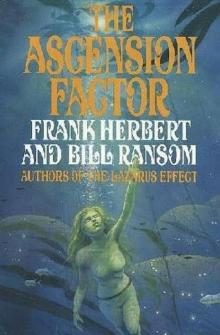 The Ascension Factor
The Ascension Factor The Heaven Makers
The Heaven Makers Children of Dune
Children of Dune Old Rambling House
Old Rambling House Dune
Dune The Worlds of Frank Herbert
The Worlds of Frank Herbert The Jesus Incident
The Jesus Incident Heretics of Dune
Heretics of Dune Whipping Star
Whipping Star Dune Messiah
Dune Messiah Man of Two Worlds
Man of Two Worlds The Book of Frank Herbert
The Book of Frank Herbert Hunters Of Dune
Hunters Of Dune The Tactful Saboteur
The Tactful Saboteur Soul Catcher
Soul Catcher God Emperor of Dune
God Emperor of Dune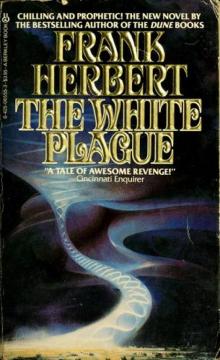 The White Plague
The White Plague The Green Brain
The Green Brain The Godmakers
The Godmakers Sandworms of Dune
Sandworms of Dune Destination Void
Destination Void The Dosadi Experiment
The Dosadi Experiment Eye
Eye High-Opp
High-Opp The Eyes of Heisenberg
The Eyes of Heisenberg Missing Link
Missing Link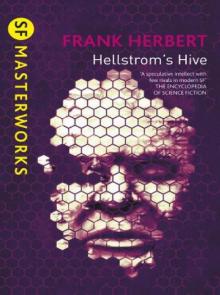 Hellstrom's Hive
Hellstrom's Hive Chapterhouse: Dune
Chapterhouse: Dune The Santaroga Barrier
The Santaroga Barrier The Dragon in the Sea
The Dragon in the Sea Operation Haystack
Operation Haystack A Thorn in the Bush
A Thorn in the Bush Four Unpublished Novels
Four Unpublished Novels Dune dc-1
Dune dc-1 Jorj X. McKie 1 - Whipping Star
Jorj X. McKie 1 - Whipping Star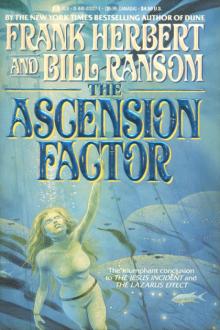 DV 4 - The Ascension Factor
DV 4 - The Ascension Factor Frank Herbert - Dune Book 4 - God Emperor Of Dune
Frank Herbert - Dune Book 4 - God Emperor Of Dune ChapterHouse: Dune dc-6
ChapterHouse: Dune dc-6 The Ascension Factor w-4
The Ascension Factor w-4 A Game of Authors
A Game of Authors Children of Dune dc-3
Children of Dune dc-3 Destination: Void: Prequel to the Pandora Sequence
Destination: Void: Prequel to the Pandora Sequence The Collected Stories of Frank Herbert
The Collected Stories of Frank Herbert Dune Messiah dc-2
Dune Messiah dc-2 Frank Herbert - Dune Book 5 - Heretics of Dune
Frank Herbert - Dune Book 5 - Heretics of Dune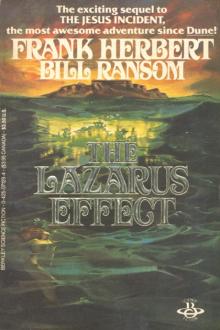 DV 3 - The Lazarus Effect
DV 3 - The Lazarus Effect The Jesus Incident w-2
The Jesus Incident w-2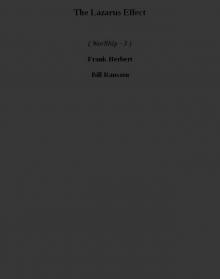 The Lazarus Effect w-3
The Lazarus Effect w-3 Frank Herbert
Frank Herbert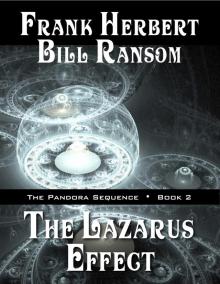 The Ascension Factor: Pandora Sequence
The Ascension Factor: Pandora Sequence Dune (40th Anniversary Edition)
Dune (40th Anniversary Edition)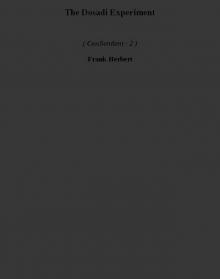 The Dosadi Experiment c-2
The Dosadi Experiment c-2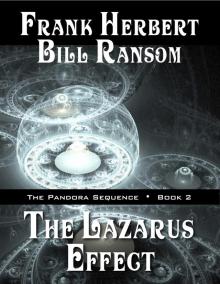 The Lazarus Effect
The Lazarus Effect God Emperor of Dune dc-4
God Emperor of Dune dc-4 The Pandora Sequence: The Jesus Incident, the Lazarus Effect, the Ascension Factor
The Pandora Sequence: The Jesus Incident, the Lazarus Effect, the Ascension Factor The Green Brain (v4.0)
The Green Brain (v4.0) The Heaven Makers (v4.0)
The Heaven Makers (v4.0) Heretics of Dune dc-5
Heretics of Dune dc-5